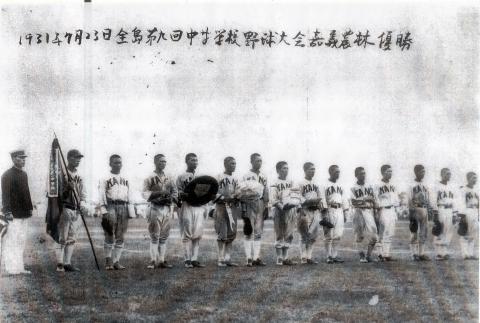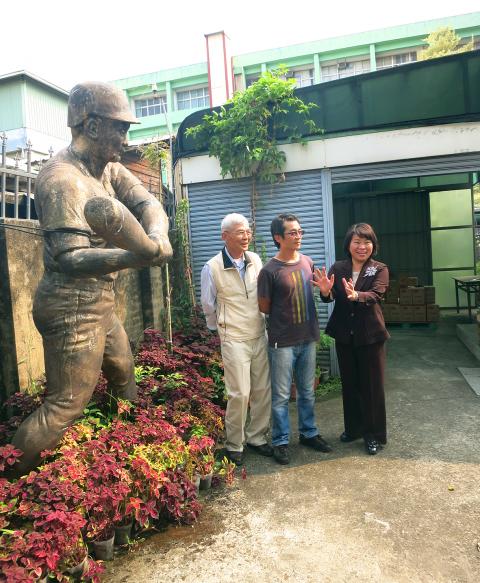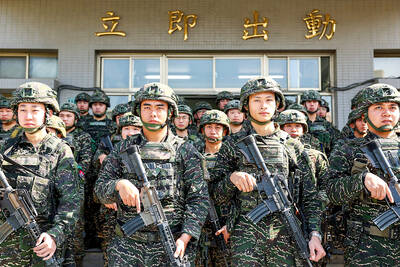When Wei Te-sheng (魏德聖), the director of Cape No. 7 and Seediq Bale, heard of a Chiayi high school baseball team that “almost” won the all-Japan Koshien summer tournament in Kobe in 1931, he just knew he had to make a movie about it. So he wrote a script, signed on as producer, asked Umin Boya to direct it, raised a pile of money, hired a cast of Taiwanese actors and extras, and the film, currently in production in Chiayi and other cities, is set to be released in early 2014.
The movie’s working title is “Kano,” the nickname of the old Chiayi Agricultural and Forestry Vocational High School, which no longer exists. The nickname comes from the first two English letters of the two Japanese words “Ka-gi No-rin,” with ‘Kagi’’ being the Japanese word for Chiayi and ‘’No-rin’’ being the Japanese term for agriculture and forestry.
“From time to time, Japanese tourists will stop here,” says Yu Guei-in (余佳蓁), a senior at National Chiayi University (NCYU), who works part-time as a secretary at the museum.

Photo: AFP
“Last summer, a Japanese reporter from the Sankei Shimbun newspaper came here to look around and ask us some questions about the movie, and three French tourists stopped by in August while visiting the city’s temples,” Yu says.
While most people in Chiayi know about the team’s exploits in 1931, few are aware that just a few steps from the modern 15-story glass-paneled city hall there is an old one-story Japanese-era building, hidden behind a long cement wall, that serves as an informal Kano museum for the team.
The building, still sporting sweet-smelling tatami mats and sliding paper doors in the Japanese style, houses the offices of the Kano Alumni Association. Supported by the city and a local university, it has a volunteer staff and is open Monday to Friday for tourists, scholars and history buffs. It’s a quiet place now, but once the movie is released, it could get crowded.

Photo: AFP
Inside the wooden structure, built in the 1920s, there is a library with dozens of copies of the Kano Alumni Association annual magazine, still published in Chinese by National Chiayi University (MCYU), and hundreds of old black-and-white photographs of the 1931 baseball squad. Outside in the courtyard there’s even a statue of one of the original team’s players holding up a bat and seemingly still ready to play ball.
Tourism opportunity
The Chiayi city government sees an opportunity in the 2014 release of the Wei-produced movie, which is said to be a cross between a baseball drama and a love story. Yes, Wei wrote a young woman into the script, and she’ll be the love interest of one of the players. So with expectations high that the movie will attract tourists from across Taiwan and Japan in the future, the city government’s tourism department donated a nice chunk of change — NT$500,000 — to help fund the movie.
Nearby, National Chung Cheng University, just a 30-minute bus ride from Chiayi, is planning to set up a tourist attraction based on the movie, since some of the action scenes will be filmed at Chung Cheng University.
According to Angel Chen (陳廷萱), a graduate student working on her master’s degree in marketing, the movie’s connection to Chiayi and Taiwan’s history during the Japanese Colonial Period (1895-1945) offers a “perfect storm” of public relations and tourism opportunities for all those involved in the movie’s production.
Location, location, location
Location shooting for the movie is going on now, in Chiayi, Taichung, Tainan and Kaohsiung, according to film industry sources. Some sets will be built and many locals have been hired as extras to appear in various crowd scenes. Umin Boya, an Aboriginal actor in his 30s who was in the cast of Seediq Bale, is directing the movie from a script by Wei. The director, who played baseball as a teenager, told reporters earlier this year that he understands the emotions of ball players and is looking forward to the film’s release, not only in Taiwan, but in Japan and other countries in Asia.
Imperial Japan in those days had colonies in Taiwan, Korea and Manchuria, and teams from those regions were invited to Koshien if they made the grade. But only the Kano team from Taiwan was invited to the all-Japan championships, and not just once, according to Masato Fujishima, a Japanese reporter for the Asahi Shimbun in Tokyo, but five times. However, it was only the 1931 team that played their hearts out all the way to the Koshien finals.
stealing the show
According to Fujishima, the 1931 Kano team won the hearts of Japanese baseball fans, and even today, the story has not been forgotten among Japanese. So a feature movie about the team, set in the 1930s and adding a love story to the drama of the final game in Kobe on a hot summer day, should go over well in Japan, too.
The movie will tell the story of a high school baseball team comprised of three ethnic groups — Japanese, Han Chinese and Aboriginal boys — and one tough Japanese coach.
The “Chiayi Norin Gakko’’ team took a boat from Keelung to Japan in the summer of 1931 and turned a lot of heads in Kobe.
By some kind of baseball miracle, the teenage boys from Taiwan surprised the experts in Imperial Japan and came in second. Their earlier run of good luck and the final game is now part of Taiwan lore, but for most people it’s a long forgotten story. Wei hopes to put a new spin on it.
While the Kano team is now history, its “never give up” attitude will be a big part of the movie, according to Umin Boya. And with an unofficial Kano museum and outdoor shrine still standing in the middle of Chiayi today, the building’s staff is getting ready for what might just be a big tourism boom when the film is finally released.

That US assistance was a model for Taiwan’s spectacular development success was early recognized by policymakers and analysts. In a report to the US Congress for the fiscal year 1962, former President John F. Kennedy noted Taiwan’s “rapid economic growth,” was “producing a substantial net gain in living.” Kennedy had a stake in Taiwan’s achievements and the US’ official development assistance (ODA) in general: In September 1961, his entreaty to make the 1960s a “decade of development,” and an accompanying proposal for dedicated legislation to this end, had been formalized by congressional passage of the Foreign Assistance Act. Two

Despite the intense sunshine, we were hardly breaking a sweat as we cruised along the flat, dedicated bike lane, well protected from the heat by a canopy of trees. The electric assist on the bikes likely made a difference, too. Far removed from the bustle and noise of the Taichung traffic, we admired the serene rural scenery, making our way over rivers, alongside rice paddies and through pear orchards. Our route for the day covered two bike paths that connect in Fengyuan District (豐原) and are best done together. The Hou-Feng Bike Path (后豐鐵馬道) runs southward from Houli District (后里) while the

President William Lai’s (賴清德) March 13 national security speech marked a turning point. He signaled that the government was finally getting serious about a whole-of-society approach to defending the nation. The presidential office summarized his speech succinctly: “President Lai introduced 17 major strategies to respond to five major national security and united front threats Taiwan now faces: China’s threat to national sovereignty, its threats from infiltration and espionage activities targeting Taiwan’s military, its threats aimed at obscuring the national identity of the people of Taiwan, its threats from united front infiltration into Taiwanese society through cross-strait exchanges, and its threats from

March 31 to April 6 On May 13, 1950, National Taiwan University Hospital otolaryngologist Su You-peng (蘇友鵬) was summoned to the director’s office. He thought someone had complained about him practicing the violin at night, but when he entered the room, he knew something was terribly wrong. He saw several burly men who appeared to be government secret agents, and three other resident doctors: internist Hsu Chiang (許強), dermatologist Hu Pao-chen (胡寶珍) and ophthalmologist Hu Hsin-lin (胡鑫麟). They were handcuffed, herded onto two jeeps and taken to the Secrecy Bureau (保密局) for questioning. Su was still in his doctor’s robes at